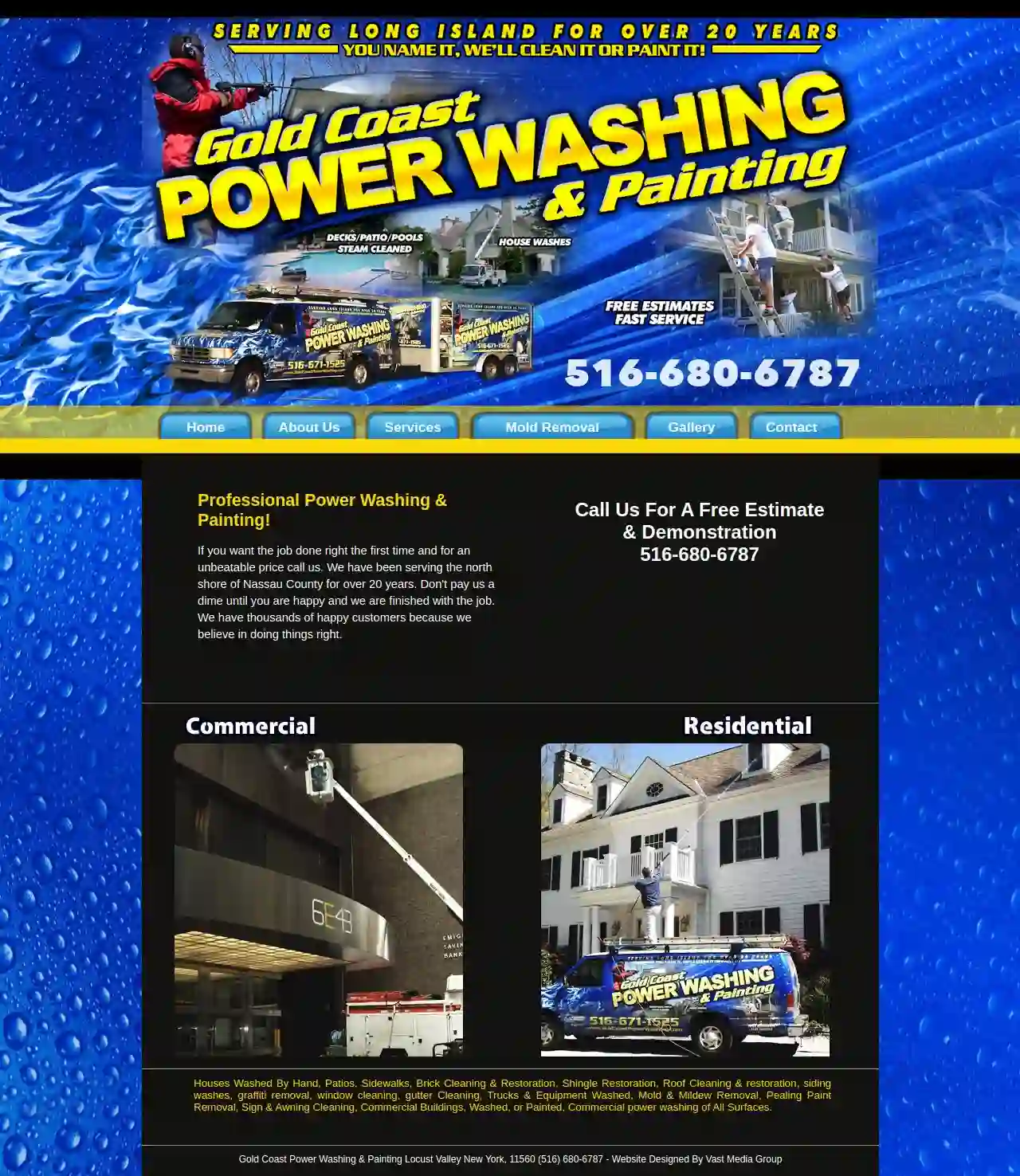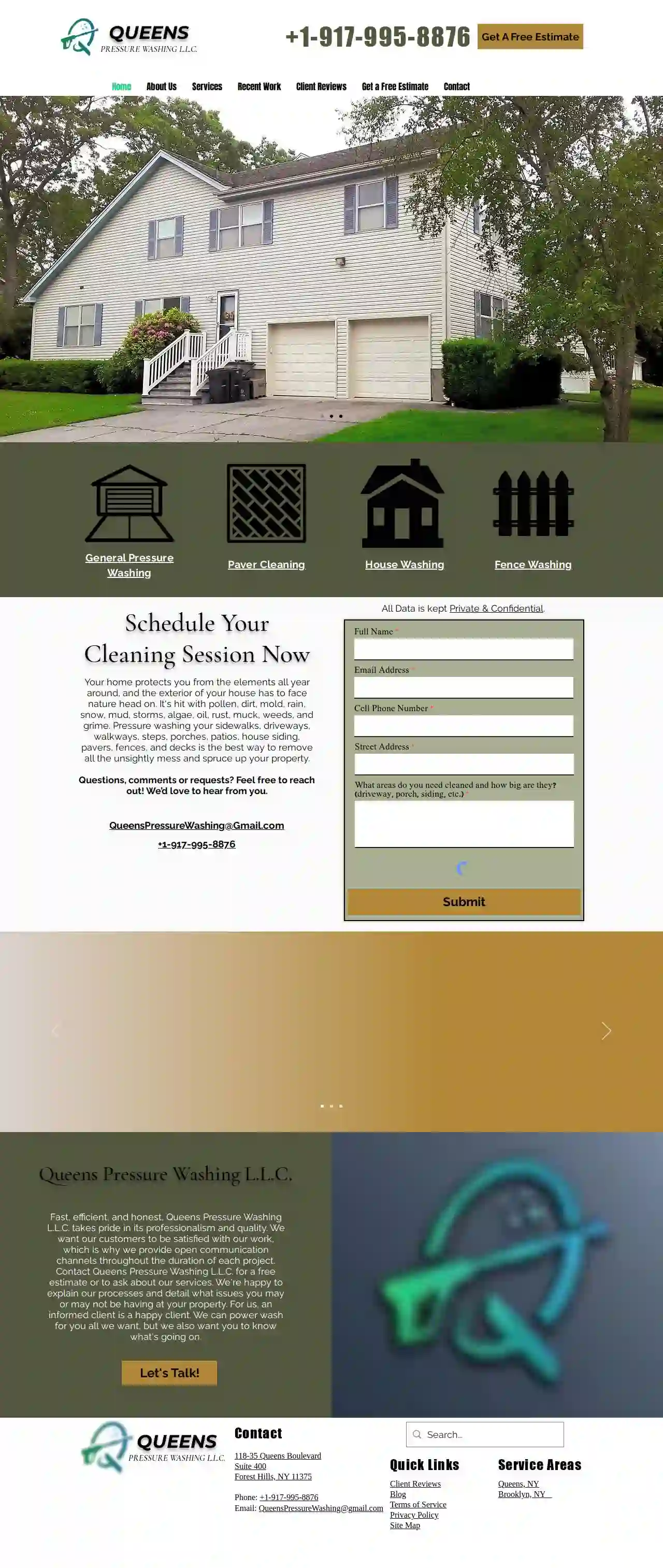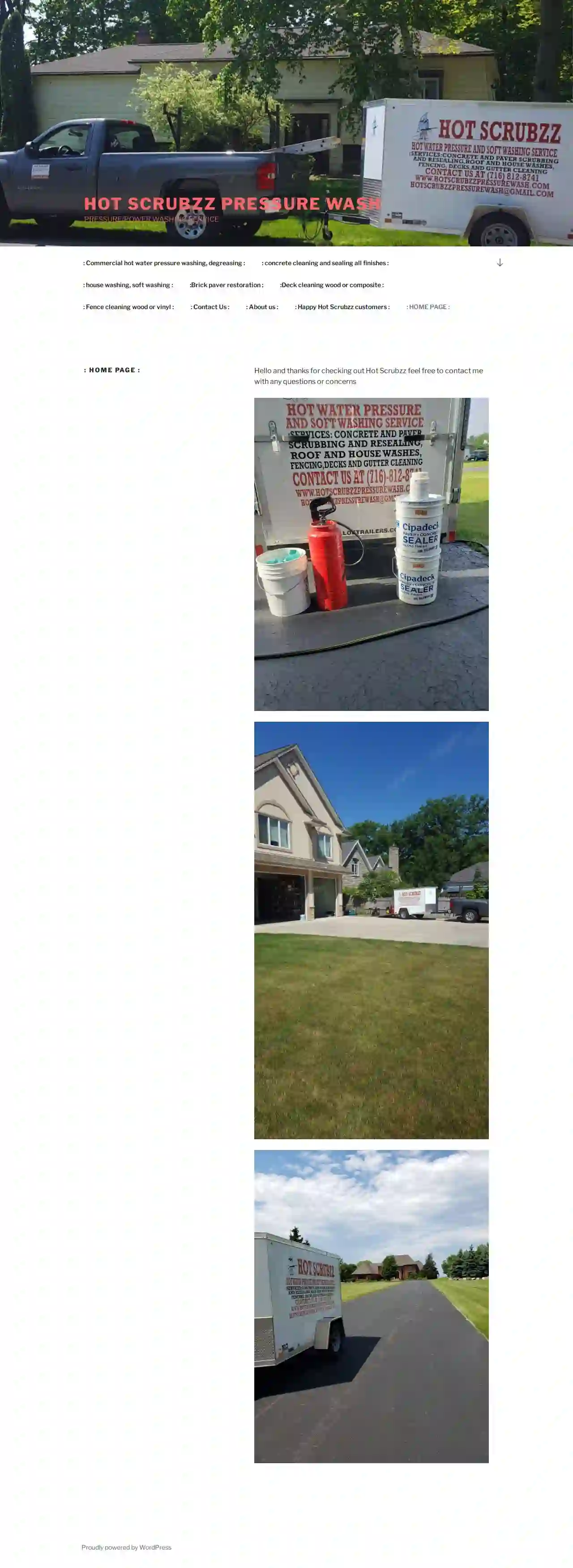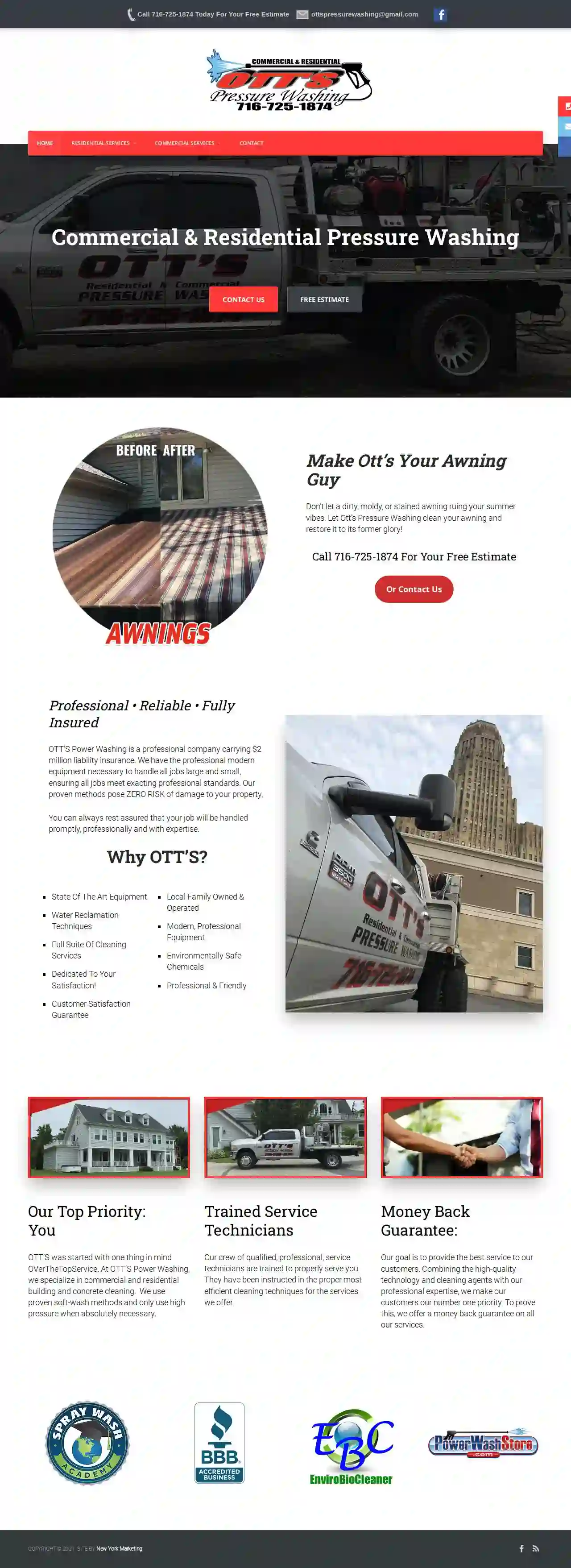Pressure Washing Fort Ann
Find Power Washing in Fort Ann
Receive up to 3 Driveway Cleaning quotes for your project today! Compare profiles, reviews, accreditations, portfolio, etc... and choose the best deal.

Gold Coast Power Washing
4.714 reviews5 Brewster Street, #305, Glen Cove, 11560, USGold Coast Power Washing & Painting is a family-owned and operated business serving the North Shore of Nassau County for over 20 years. We are dedicated to providing top-quality power washing and painting services to both residential and commercial clients. Our mission is to become Long Island's #1 Power Washing company by exceeding customer expectations with every project. We pride ourselves on our experience, expertise, and commitment to customer satisfaction. Our team of skilled professionals utilizes state-of-the-art equipment and techniques to deliver exceptional results. Whether you need a simple house wash or a complex commercial building restoration, we have the knowledge and resources to handle it all. At Gold Coast Power Washing & Painting, we believe in: Providing unbeatable prices and transparent pricing. Ensuring customer satisfaction by completing the job right the first time. Offering a free estimate and demonstration to all potential clients. Maintaining a clean and professional work environment. Providing excellent customer service and building lasting relationships. We are fully insured and licensed, giving you peace of mind knowing your property is in safe hands. Contact us today for a free estimate and let us transform your property with our professional power washing and painting services.
- Services
- Why Us?
- Our Team
- Gallery
Get Quote
Bright house power washing
520 reviews264 Main Street, East Rutherford, 07073, USBright House Power Washing is a locally owned and operated business dedicated to providing top-rated power washing services to transform your home's appearance. Our skilled professionals utilize the latest equipment and best cleaning supplies to effectively remove grime, dirt, algae, and mildew from any surface without causing damage. We offer a comprehensive range of services, including roof cleaning, deck power washing, house soft washing, driveway power washing, and more. We understand the importance of maintaining a clean and pristine exterior for your property. Our power washing process not only enhances curb appeal but also prevents long-term damage to surfaces, saving you money on costly repairs in the future. At Bright House Power Washing, we prioritize customer satisfaction. We are fully insured, professional, and experienced, and we communicate clearly to understand your expectations. We take pride in our work and strive to build lasting relationships with our clients. Call us today to schedule your cleaning service and experience the Bright House Power Washing difference!
- Services
- Why Us?
- Gallery
Get Quote
Vanishing Pressure Wash LLC
4.996 reviews4494 Upper Mt. Rd., Lockport, 14094, USIncrease Your Property Value & Curb Appeal With Vanishing Pressure Wash. At Vanishing Pressure Wash LLC, our expert team of professionals can achieve such a clean and much more! As leaders in the pressure washing industry, we're equipped to give your home all of the benefits of a true professional pressure washing service. From house washing to commercial pressure washing, we have all the tools and experience to give your home or business the one-of-a-kind clean that it deserves. If you live in the Western NY area and need a pressure washing service that only the pros can deliver, call our offices today.
- Services
- Why Us?
- Accreditations
- Our Team
- Testimonials
- Gallery
Get Quote
Queens Pressure Washing L.L.C.
4.816 reviewsSuite 400, Forest Hills, NY, 118-35 Queens Boulevard, 11375, USQueens Pressure Washing L.L.C. is a professional pressure washing company that offers a variety of services including general pressure washing, softwashing, house washing, brownstone washing, awning cleaning, fence washing, paver cleaning, polymeric sand installation, paver sealing, and stain removal. The company is dedicated to providing high-quality services and ensuring customer satisfaction. They offer free estimates and can be contacted through their website or by phone.
- Services
- Why Us?
- Accreditations
- Our Team
- Testimonials
- Gallery
Get Quote
Pressure Wash Long Island
5113 reviews123 Main St, Suite 101, Oyster Bay, 11771, USPressure Wash Long Island is a local business that specializes in providing a variety of cleaning services including power washing, roof cleaning, gutter cleaning, window cleaning, paver sealing, and house washing. They offer their services to various cities in Long Island, NY, and have a team of experienced professionals who are dedicated to providing top-quality service to their clients. The business is fully accredited and insured, and they have received numerous positive testimonials from their satisfied customers.
- Services
- Why Us?
- Accreditations
- Our Team
- Testimonials
- Gallery
Get Quote
Hot scrubzz pressure washing service
59 reviewsBuffalo, USHello and thanks for checking out Hot Scrubzz feel free to contact me with any questions or concerns. Proudly powered by WordPress.
- Services
- Why Us?
- Gallery
Get Quote
OTT'S Pressure Washing
512 reviewsBuffalo, USOTT’S Power Washing is a professional company carrying $2 million liability insurance. We have the professional modern equipment necessary to handle all jobs large and small, ensuring all jobs meet exacting professional standards. Our proven methods pose ZERO RISK of damage to your property. You can always rest assured that your job will be handled promptly, professionally and with expertise. OTT’S was started with one thing in mind OVerTheTopService. At OTT’S Power Washing, we specialize in commercial and residential building and concrete cleaning. We use proven soft-wash methods and only use high pressure when absolutely necessary. Our crew of qualified, professional, service technicians are trained to properly serve you. They have been instructed in the proper most efficient cleaning techniques for the services we offer. Our goal is to provide the best service to our customers. Combining the high-quality technology and cleaning agents with our professional expertise, we make our customers our number one priority. To prove this, we offer a money back guarantee on all our services.
- Services
- Why Us?
- Gallery
Get Quote
WNY Pressure Wash
4.984 reviews5145 East Main St Rd, Batavia, 14020, USWNY Pressure Wash is Western New York's premier pressure washing company, proudly serving Erie, Genesee, Wyoming, Niagara, Orleans, Livingston, and Monroe Counties. We specialize in a wide range of pressure washing and soft washing services for both residential and commercial properties. Our team of experts is dedicated to delivering exceptional results using cutting-edge equipment and industry best practices. We are fully licensed, insured, and certified, ensuring your peace of mind. At WNY Pressure Wash, we believe in exceeding customer expectations by providing: * **Excellence:** Unwavering commitment to delivering top-notch service in every project. * **Integrity:** Honesty, transparency, and ethical conduct in all our interactions. * **Customer-Centricity:** Prioritizing your needs and satisfaction above all else. * **Safety:** Uncompromising dedication to the well-being of our team, clients, and the environment. * **Innovation:** Embracing the latest industry advancements and techniques to deliver unmatched results. Whether you need house washing in Buffalo, roof cleaning in Rochester, or any other pressure washing service in Western New York, WNY Pressure Wash is your trusted partner. Contact us today for a free estimate and let us transform your property!
- Services
- Why Us?
- Accreditations
- Our Team
- Testimonials
- Gallery
Get Quote
JBLI Power Washing
505 5th Avenue, New Hyde Park, 11040, USJBLI Power Washing is your local pressure washing company, primarily based in Huntington! We bring many years of experience in being the best pressure washing company possible. Our team is driven and dedicated to our clients. Our equipment is stellar, and our mindset is ready for action. We provide the best service to all of our clients because we care about the people we work with just as much as we care about the communities we serve. JBLI Power Washing offers pressure washing services in more than just Huntington! Giving back to the community is crucial. Being able to make an impact on the world through our pressure washing services is truly heart-warming for our teams. Cleaning up your siding, patio, or roof is not only about the cleaning. It is also about presentation. Pressure washing offers a true caterpillar effect to your home and can aid in transforming the once dirty areas into beautiful, boastful, butterfly-worthy spaces.
- Services
- Why Us?
- Gallery
Get Quote
EZ Power Wash NYC
51 reviews123 Main St, New York, NY, 10001, USEZ Power Wash NYC offers commercial and residential pressure washing services to ensure your property looks clean and polished. Our services include Patio Cleaning, Roof Cleaning, Sidewalk Cleaning NYC, Solar Panel Cleaning, Awning Cleaning, Graffiti Removal NYC, Parking Lot Cleaning, Industrial & Warehouse Cleaning, and more. We maintain a 100% satisfaction guarantee and offer unmatched customer service experience.
- Services
- Why Us?
- Accreditations
- Our Team
- Testimonials
- Gallery
Get Quote
Over 60,241+ Janitorial Companies onboarded
Our cleaning contractors operate in Fort Ann and beyond!
CleaningMatch has curated and vetted Top Janitorial Services arround Fort Ann. Find a top & reliable pro today.
Frequently Asked Questions About Pressure Washing
- Reputation and Reviews: Check online reviews and ask for referrals to gauge the company's reputation and customer satisfaction.
- Experience and Expertise: Look for a company with a proven track record and experience in pressure washing various surfaces.
- Licensing and Insurance: Ensure the company is licensed and insured to protect you from liability.
- Equipment and Techniques: Inquire about the company's equipment and techniques to ensure they use appropriate pressure levels and cleaning solutions.
- Quotes and Pricing: Obtain detailed quotes that outline all services and costs.
- Professionalism and Communication: Choose a company that is responsive, communicative, and professional.
- Online Reviews: Check online reviews on platforms like Google, Yelp, and Facebook to gauge customer satisfaction and service quality.
- Experience and Expertise: Look for companies with a proven track record and experience in pressure washing various surfaces.
- Licensing and Insurance: Ensure the company is licensed and insured to protect you from liability in case of accidents or damage.
- Equipment and Techniques: Inquire about the company's equipment and techniques to ensure they use appropriate pressure levels and cleaning solutions for different surfaces.
- Quotes and Pricing: Obtain detailed quotes from multiple pressure washing companies and compare their pricing. Make sure the quotes are transparent, outlining all services and costs.
- Professionalism and Communication: Choose a company that is responsive, provides clear communication, and demonstrates professionalism in its interactions.
- Cover or Shield Plants: Before pressure washing, cover or shield delicate plants and landscaping with tarps, plastic sheeting, or painter's tape to protect them from water spray and chemicals.
- Use Lower Pressure Settings: If pressure washing near plants, use lower pressure settings and avoid directing the spray directly at them.
- Rinse Plants with Water: After pressure washing, rinse plants thoroughly with plain water to dilute any chemicals that may have landed on them.
- Choose Plant-Safe Cleaning Solutions: If using cleaning solutions, opt for environmentally friendly or plant-safe options whenever possible.
- Hard Surfaces: Pressure washing is often successful in removing graffiti from hard surfaces like brick, concrete, or metal.
- Delicate Surfaces: For delicate surfaces like wood or painted surfaces, a gentler approach using specialized graffiti removal products and techniques may be necessary.
- Professional Graffiti Removal: For stubborn or extensive graffiti, consider hiring a professional graffiti removal service. They have specialized equipment, cleaning solutions, and experience in dealing with various types of graffiti.
What should I look for in a pressure washing company?
A reputable pressure washing company will prioritize safety, use appropriate cleaning methods, and provide excellent customer service.
How do I find a good pressure washing service?
Utilize online directories like CleaningMatch to find and compare qualified pressure washing services in your area.
Can pressure washing damage my plants?
Taking these precautions minimizes the risk of damage to your plants and landscaping during pressure washing.
Can pressure washing remove graffiti?
If you're attempting DIY graffiti removal, always test the cleaning solution and pressure washing technique on an inconspicuous area first to avoid damaging the surface.
What should I look for in a pressure washing company?
- Reputation and Reviews: Check online reviews and ask for referrals to gauge the company's reputation and customer satisfaction.
- Experience and Expertise: Look for a company with a proven track record and experience in pressure washing various surfaces.
- Licensing and Insurance: Ensure the company is licensed and insured to protect you from liability.
- Equipment and Techniques: Inquire about the company's equipment and techniques to ensure they use appropriate pressure levels and cleaning solutions.
- Quotes and Pricing: Obtain detailed quotes that outline all services and costs.
- Professionalism and Communication: Choose a company that is responsive, communicative, and professional.
A reputable pressure washing company will prioritize safety, use appropriate cleaning methods, and provide excellent customer service.
How do I find a good pressure washing service?
- Online Reviews: Check online reviews on platforms like Google, Yelp, and Facebook to gauge customer satisfaction and service quality.
- Experience and Expertise: Look for companies with a proven track record and experience in pressure washing various surfaces.
- Licensing and Insurance: Ensure the company is licensed and insured to protect you from liability in case of accidents or damage.
- Equipment and Techniques: Inquire about the company's equipment and techniques to ensure they use appropriate pressure levels and cleaning solutions for different surfaces.
- Quotes and Pricing: Obtain detailed quotes from multiple pressure washing companies and compare their pricing. Make sure the quotes are transparent, outlining all services and costs.
- Professionalism and Communication: Choose a company that is responsive, provides clear communication, and demonstrates professionalism in its interactions.
Utilize online directories like CleaningMatch to find and compare qualified pressure washing services in your area.
Can pressure washing damage my plants?
- Cover or Shield Plants: Before pressure washing, cover or shield delicate plants and landscaping with tarps, plastic sheeting, or painter's tape to protect them from water spray and chemicals.
- Use Lower Pressure Settings: If pressure washing near plants, use lower pressure settings and avoid directing the spray directly at them.
- Rinse Plants with Water: After pressure washing, rinse plants thoroughly with plain water to dilute any chemicals that may have landed on them.
- Choose Plant-Safe Cleaning Solutions: If using cleaning solutions, opt for environmentally friendly or plant-safe options whenever possible.
Taking these precautions minimizes the risk of damage to your plants and landscaping during pressure washing.
Can pressure washing remove graffiti?
- Hard Surfaces: Pressure washing is often successful in removing graffiti from hard surfaces like brick, concrete, or metal.
- Delicate Surfaces: For delicate surfaces like wood or painted surfaces, a gentler approach using specialized graffiti removal products and techniques may be necessary.
- Professional Graffiti Removal: For stubborn or extensive graffiti, consider hiring a professional graffiti removal service. They have specialized equipment, cleaning solutions, and experience in dealing with various types of graffiti.
If you're attempting DIY graffiti removal, always test the cleaning solution and pressure washing technique on an inconspicuous area first to avoid damaging the surface.